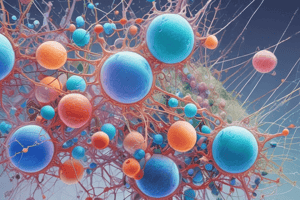Podcast
Questions and Answers
What is the main component of the extracellular matrix (ECM)?
What is the main component of the extracellular matrix (ECM)?
- Cell type
- Vascularity
- Ground substance (correct)
- Fibers
Which of the following is NOT a type of fiber found in the extracellular matrix?
Which of the following is NOT a type of fiber found in the extracellular matrix?
- Collagen
- Fibrin (correct)
- Elastic
- Reticular
What primarily composes the ground substance of the extracellular matrix?
What primarily composes the ground substance of the extracellular matrix?
- Cells and carbohydrates
- Fibers and minerals
- Collagen and lipids
- Water and proteins (correct)
What is the main origin of all connective tissues?
What is the main origin of all connective tissues?
Which of these connective tissue types is most likely to be avascular?
Which of these connective tissue types is most likely to be avascular?
What structures are primarily responsible for transmitting electrical impulses in nervous tissue?
What structures are primarily responsible for transmitting electrical impulses in nervous tissue?
In terms of vascularity, which type of connective tissue is generally poorly vascularized?
In terms of vascularity, which type of connective tissue is generally poorly vascularized?
What is the main function of the soma in a neuron?
What is the main function of the soma in a neuron?
What is the primary function of the control center in the homeostatic process?
What is the primary function of the control center in the homeostatic process?
Which component of the homeostatic control system receives instructions from the control center?
Which component of the homeostatic control system receives instructions from the control center?
What term was coined by Walter Cannon in 1926 that describes the body's ability to maintain stable conditions?
What term was coined by Walter Cannon in 1926 that describes the body's ability to maintain stable conditions?
What pathway carries information from the receptor to the control center?
What pathway carries information from the receptor to the control center?
Which system regulates the organ systems to maintain homeostasis?
Which system regulates the organ systems to maintain homeostasis?
What could be a possible consequence of failure to maintain homeostasis in the body?
What could be a possible consequence of failure to maintain homeostasis in the body?
Which variable is NOT mentioned as part of the homeostatic controls outlined?
Which variable is NOT mentioned as part of the homeostatic controls outlined?
What happens to the entire body when one organ system is disrupted?
What happens to the entire body when one organ system is disrupted?
Which of the following cavities contains the heart?
Which of the following cavities contains the heart?
Which of these organs is primarily located in the hypogastric region?
Which of these organs is primarily located in the hypogastric region?
What does the acronym PRIB refer to in relation to the organs in the hypogastric region?
What does the acronym PRIB refer to in relation to the organs in the hypogastric region?
Which cavity is defined as comprising the abdominal and pelvic cavities?
Which cavity is defined as comprising the abdominal and pelvic cavities?
What is the primary function of the extracellular matrix?
What is the primary function of the extracellular matrix?
Which type of junction is primarily found between epithelial cells?
Which type of junction is primarily found between epithelial cells?
What is contained within the mediastinum?
What is contained within the mediastinum?
Which of the following regions is NOT part of the main body cavities?
Which of the following regions is NOT part of the main body cavities?
Where is ciliated columnar epithelium primarily found?
Where is ciliated columnar epithelium primarily found?
What are the characteristics of stratified squamous epithelial cells?
What are the characteristics of stratified squamous epithelial cells?
What is the primary function of pseudostratified columnar epithelium?
What is the primary function of pseudostratified columnar epithelium?
What distinguishes keratinized stratified squamous epithelium from non-keratinized?
What distinguishes keratinized stratified squamous epithelium from non-keratinized?
Which type of epithelium is typically involved in secretion and absorption?
Which type of epithelium is typically involved in secretion and absorption?
What is a unique feature of pseudostratified columnar epithelium?
What is a unique feature of pseudostratified columnar epithelium?
What type of epithelium would you expect to find lining the epidermis of the skin?
What type of epithelium would you expect to find lining the epidermis of the skin?
Which type of epithelium would most likely line moist areas like the mouth and esophagus?
Which type of epithelium would most likely line moist areas like the mouth and esophagus?
What is the primary function of transitional epithelium?
What is the primary function of transitional epithelium?
In which location would you primarily find transitional epithelium?
In which location would you primarily find transitional epithelium?
What distinguishes stratified columnar epithelium from other types of epithelium?
What distinguishes stratified columnar epithelium from other types of epithelium?
Which statement accurately describes the function of stratified columnar epithelium?
Which statement accurately describes the function of stratified columnar epithelium?
Where in the body is stratified columnar epithelium typically found?
Where in the body is stratified columnar epithelium typically found?
What is the defining characteristic of transitional epithelium's structure?
What is the defining characteristic of transitional epithelium's structure?
Which of the following tissues is the most abundant and widely distributed in the human body?
Which of the following tissues is the most abundant and widely distributed in the human body?
What type of epithelial tissue is primarily involved with secretion in males?
What type of epithelial tissue is primarily involved with secretion in males?
Flashcards are hidden until you start studying
Study Notes
Extracellular Matrix (ECM)
- Composed of ground substance and fibers.
- Ground substance consists mainly of water, proteins (cell adhesion proteins), and polysaccharides (proteoglycans).
- ECM supports connective tissue (CT) cells.
Types of Fibers in ECM
- Collagen: Provides strength and structure.
- Elastic fibers: Offer flexibility and resilience.
- Reticular fibers: Form supportive networks.
Connective Tissue Characteristics
- All connective tissues derive from mesenchyme.
- Vascularity varies; most types have rich blood supplies except cartilage (avascular) and dense connective tissue (poorly vascularized).
Nervous Tissue
- Neurons are the primary functional units responsible for transmitting electrical impulses.
- Seven characteristics include structure (cell body/Soma, nucleus and organelles) and function.
Body Regions and Cavities
- Major abdominal regions include hypochondriac (upper), iliac (lower), and lumbar (middle).
- Most organs of the hypogastric region include parts of the intestine, rectum, and bladder.
Main Body Cavities
-
Ventral Cavity:
- Contains thoracic cavity with mediastinum (houses heart, esophagus, trachea).
- Contains pleural cavities.
- Separates abdominopelvic cavity (digestive organs).
-
Dorsal Cavity:
- Cranial cavity houses the brain.
Epithelium Types and Functions
-
Ciliated Columnar Epithelium:
- Structure: Single layer, often ciliated.
- Function: Secretion and movement of mucus; located in the respiratory tract.
-
Stratified Squamous Epithelium:
- Structure: Flat surface cells; deeper may be cuboidal or columnar.
- Keratinized: Protection, found in skin.
- Non-keratinized: Protection in moist areas (mouth, esophagus).
-
Pseudostratified Columnar Epithelium:
- Structure: Appears stratified, single layer.
- Function: Secretion/movement of mucus; found in the respiratory tract.
-
Stratified Cuboidal Epithelium:
- Structure: Surface cells cuboidal, usually two or three layers.
- Function: Protection, secretion, absorption; found in ducts.
-
Transitional Epithelium:
- Structure: Surface cells vary from squamous to cuboidal depending on stretching.
- Function: Flexibility and protection; found in urinary bladder and ureters.
Homeostasis
- Definition: Ability to maintain stable conditions despite external changes.
- Involves regulating acid levels, blood sugar, and other variables.
- All organ systems collaborate to maintain homeostasis; disruption in one may affect others.
Homeostatic Control Mechanisms
- Receptor: Monitors changes; sends information via afferent pathway to control center.
- Control Center: Analyzes information, determines response, maintains normal levels.
- Effector: Executes response from control center via efferent pathway; influences body's response to stimuli.
Histology
- Study of tissues and cells under a microscope.
Studying That Suits You
Use AI to generate personalized quizzes and flashcards to suit your learning preferences.



